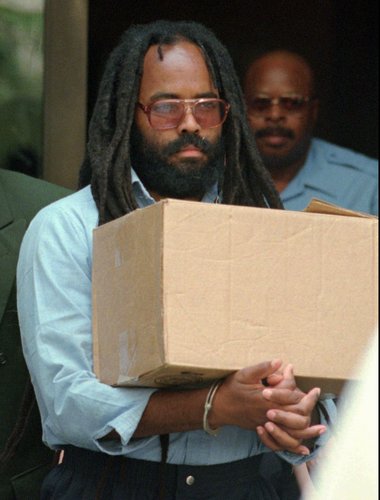by Pam Africa and Joe Piette, Mobilization4Mumia
Philadelphia, Jan. 25, 2019 – Just weeks after it was revealed that six previously undisclosed boxes of files labeled “Mumia” were allegedly “discovered” in an abandoned furniture closet in Philadelphia District Attorney Larry Krasner’s office, hundreds of boxes of prisoner’s files have also been found. A Jan. 18 “supplementary verification” from the DA’s Post-Conviction Relief Act Unit (PCRA) revealed that files from imprisoned journalist and activist Mumia Abu-Jamal’s case were among hundreds of other boxes hidden in a storage room. Supporters of Abu-Jamal say the contents could prove malfeasance and lead to dismissal of charges and the release of Abu-Jamal and other defendants.
Two years after Pennsylvania Common Pleas Court Judge Leon Tucker ordered the DA to release all files in the Abu-Jamal case, a treasure trove of hidden boxes have surfaced amidst dozens of recent protests nationwide asserting the innocence of the imprisoned radio journalist.
On Jan. 22, Krasner’s office released a misleading statement, asserting that a search of the newly discovered Abu-Jamal boxes proves Pennsylvania Supreme Court Judge Ron Castille had no personal involvement in the prosecution of Mumia as Philly district attorney. However, the statement failed to acknowledge that Judge Leon Tucker’s Dec. 27, 2018, ruling granted relief to Mumia. It showed that according to the Pennsylvania Rules of Judicial Conduct, Judge Castille was biased and should have recused himself from the Abu-Jamal case.
The statement failed to say whether or not Krasner will appeal Tucker’s decision. The statement failed to mention that given the long history of corruption in the Philadelphia District Attorney’s Office, the contents in the hundreds of other hidden boxes could prove the innocence of many prisoners.
According to the Pennsylvania Rules of Judicial Conduct, Judge Castille was biased and should have recused himself from the Abu-Jamal case.
According to Krasner, the contents of the six boxes found on Dec. 28 include “police paperwork, discovery materials, cassette tapes, trial preparation and jury selection notes, Internal Affairs files, PCRA preparation notes and materials, newspaper clippings etc.,” which could reveal exculpatory evidence and the extent of the police, judicial and prosecutorial frame-up of Abu-Jamal.
News of this possibility even reached prime-time television on Jan. 22, when a character in the popular sitcom Black-ish asked, “Oh, did they just free Mumia?” The current legal battle in Abu-Jamal’s case has now opened the pursuit of justice in his case and that of many others.
Published investigations of the Abu-Jamal case – by journalist David Lindorff and former TV Guide journalist, Patrick J. O’Connor, respectively – revealed that one-third of the police officers involved in collecting evidence in the 1981 Abu-Jamal case were convicted and jailed for corruption and tampering with evidence to obtain convictions. Countless cases, including that of Hip Hop artist Meek Mill show that these practices continue to this day.
“We know that upon taking office Krasner was subpoenaed to release a “Do Not Call“ list of 29 cops too tainted to testify in court trials,” said filmmaker Professor Johanna Fernandez in a previous interview. “Former DA Seth Williams had a list of 77 dirty cops. The list of police scandals that disproportionately impact Black and Brown communities goes back decades. In 1979, the Department of Justice investigation concluded that the level of tampering with evidence and homicidal violence against Black and Brown detainees by Philly Police, ‘shocks the conscience.’ Additionally, Prosecutor Joe McGill hid evidence in the original Abu-Jamal trial: the presence of a fourth person at the crime scene. Why?”
The current legal battle in Abu-Jamal’s case has now opened the pursuit of justice in his case and that of many others.
Abu-Jamal, former president of the Philadelphia Association of Black Journalists and a Peabody Award-winning producer and reporter for WUHY FM (now WHYY), the Philadelphia affiliate of National Public Radio, has always maintained his innocence in the fatal shooting of Officer Daniel Faulkner. He has argued in past appeals that the police tampered with and lost key pieces of evidence, that the prosecution manufactured evidence of guilt, suppressed proof of innocence, and selected a Jim Crow jury, among other due-process violations.
“Mumia has been inside 37 years for a crime he didn’t commit, 28 of those were spent caged on Death Row – a sentence obtained unconstitutionally, which is why he’s in general population today. We are demanding that the charges be dismissed and he be set free. What is happening to Mumia is happening to thousands of people in Pennsylvania’s prisons,” said Pam Africa, spokesperson for International Concerned Family and Friends of Mumia Abu-Jamal.
Supporters of Abu-Jamal say justice demands that the contents of all the hidden boxes be fully disclosed to their respective defendants. These discoveries also cry out for an independent people’s investigation into decades of improper practices by the Philadelphia District Attorney’s Office.
Supporters of Abu-Jamal say justice demands that the contents of all the hidden boxes be fully disclosed to their respective defendants.
Krasner ran on a platform that included standing “for justice, not just for convictions.” Now he has to decide whether or not to appeal Judge Tucker’s decision. A coalition of activists, many of whom supported his election, are now asking Krasner to keep his promise and do the right thing, not only for Abu-Jamal, but also for every prisoner whose files are in those boxes.
Pam Africa and Joe Piette can be reached at mobilization4mumia@gmail.com. Learn more at Mobilization4Mumia.com.






